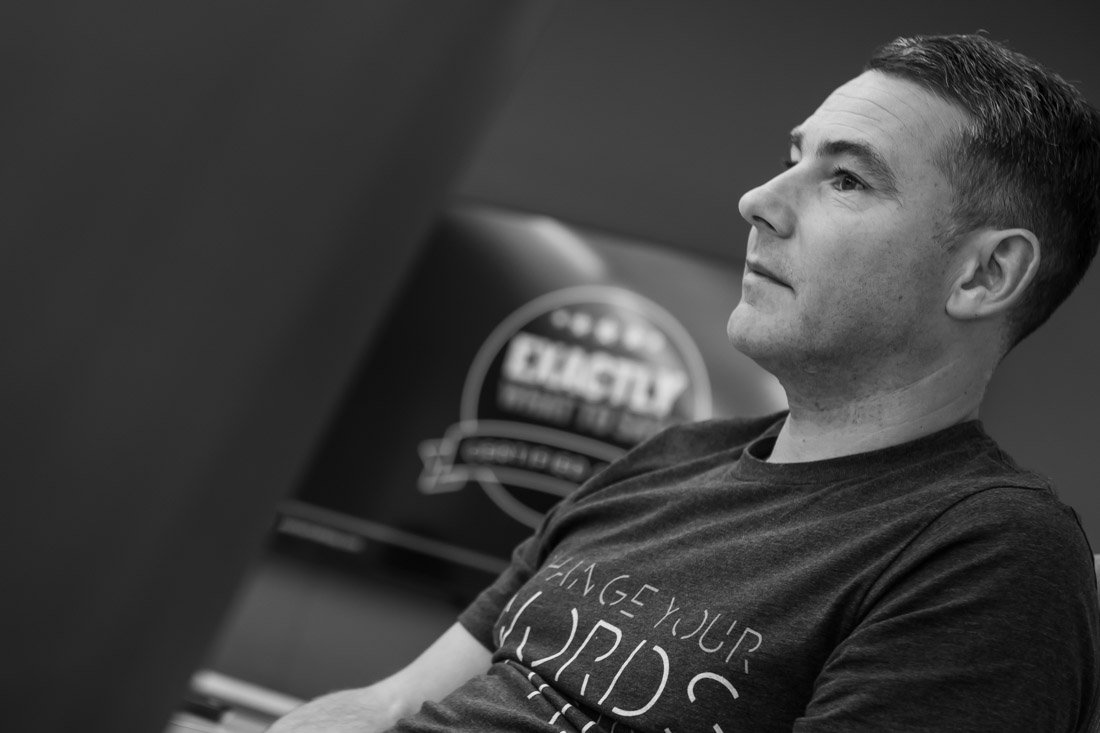Throughout the EWTS Critical Conversations webinar series, we have heard from several Certified Guides about how to apply the teachings and EWTS ethos to improve your Critical Conversations both personally and professionally.
But for Kevin Boyle’s second webinar, he wanted to discuss how you could use the book on yourself.
During his webinar, he flipped the perspective and started to look at how the book could help guide the Critical Conversations that you should be having with yourself.
Kevin, like most people, has found that over the years, the EWTS material has helped him in many different ways, but one byproduct that has surprised him the most is that it has taken him from a place of pessimism to a place of optimism.
Could it be possible that the Exactly What to Say communication techniques work just as well on yourself?
Just imagine if you could show yourself the same level of curiosity and empathy that you showed others, could it help you to understand your motivation more?
Would it help if you were easier on yourself? Would that relieve some unnecessary pressure?
During this blog, you will learn how to use the material to help yourself, get to know yourself, and perhaps even manifest more effective levels of success.
4 Cornerstones Of Self-Talk
The conversations you have with yourself are probably the most Critical Conversations you will ever have.
But what are you doing to make sure that these conversations are effective?
The 4 Cornerstones of Conversational Excellence can help you get started because they are the pillars of self-talk.
But instead of thinking about the conversations you have with others, think about how these cornerstones can help you to have more effective self-talk.
The cornerstones for self-talk are:
1
Intentionality – The worst time to think about the way that you feel is in the moment that you are feeling it
2
Curiosity – Curious questions are the fuel for great self-talk
3
Mindset – The person asking themselves the questions controls the mindset
4
Motivation – You do things for your own reasons and not theirs
Intentionality
One way that you can use this cornerstone is by adding intentionality to your thought processes.
When something affects you, try to understand why you feel the way that you feel. It’s so important to understand that the more that you put off processing how you feel about something, the more likely you are to perpetuate a negative, false narrative.
Curiosity
Curiosity is the fuel for great self-talk. Just like in conversational excellence, where curiosity is the fuel for great conversations, the same thing applies to yourself. Start asking yourself questions such as: Why do you feel the way that you feel? Why are you going through these types of feelings?
Mindset
The person asking themselves questions is in control of their mindset. The more that you ask questions, the more understanding you have about your feelings in that moment.
If you find yourself going down that path of self-fulfilling prophecies and sabotage, you can get back control of your mindset by asking why you might be feeling this way.
Motivation
You do things for your own reasons and not theirs. You must keep yourself centered on why you do what you do. Try not to allow outside forces to tell you when you should be doing it or that you’re doing it wrong.
Critical Ingredients Triangle
You can use the 3 critical ingredients to have more influential conversations to ensure that you have more effective positive self-talk, too.
The 3 ingredients are curiosity, empathy, and courage.
Curiosity
It’s always best to start with curiosity. This is one of the most important aspects of any kind of communication, external or internal. Being curious is something that will never be a bad thing. This self-curiosity is going to lead to self-discovery.
Empathy
Asking yourself the right questions could lead to a vital understanding of your feelings. Once you know what you’re trying to deal with, you can look forward with more clarity. You can also set your eyes on the successes that you want to achieve.
Courage
What are the levels of success that you need to be ready for? An awareness of them will create a positive mindset so that you can balance your expectations and stop getting stuck in negative feedback loops or mental blocks.
10 Magic Words & Phrases For Positive Self-Talk
Now you’ve got a better understanding of the theory, let’s discuss some practical applications of the magic words and phrases that you can use on yourself.
How Certain Are You?
How certain are you that this is how you feel about the situation? How certain are you that things are going to go poorly? Or how certain are you that things are going to go well?
When Was The Last Time?
Feelings of disappointment and rejection can stay with you for a really long time, but these feelings are often you being too hard on yourself.
Ask yourself – when was the last time you were actually disappointed, or when did you actually disappoint someone? It might just lead to a realization that you are being too hard on yourself.
Could It Be Possible
This is a fantastic perspective shifter. As yourself – could it be possible that they feel the same way that I feel? Could it be possible that I can change my mind about this? Could it be possible that things could go well?
How Would You Feel If…
Encouraging people to visualize something happening before it actually happens helps others to make decisions. It’s also helpful for self-momentum.
How would you feel if you completed this project and you were able to move forward on that deal? Or how would you feel if you did finish that book that you’re trying to write?
Just Imagine
Just imagine if you changed your daily routine and made time for exercise, or you made time to read. or just imagine that you interacted with a positive mindset as opposed to a negative mindset.
The Good News Is
No matter the negative curve ball you get, try to see any positives that could come from it. As soon as you feel something negative happening, find the good news as quickly as humanly possible.
Help Me Understand
As you feel something, challenge yourself, challenge those negative thoughts. Help yourself to understand the reasons behind your thoughts. Could it be possible that something that happened in your past is affecting how you talk to yourself today?
Before You Make Your Mind Up
Challenge yourself to start saying to yourself “Before I make my mind up”……
- Is there another way to do this?
- Is there another way to look at this?
- Is there an alternative?
Would It Help If
Would it help if you took some time to think about this? Would it help if you walked away from it for a second? Would it help if you told them that you don’t know how to process this information?
Just Out Of Curiosity
Just out of curiosity, why is this your default reaction? Why is this the way that you go every single time this happens? Try to figure out why you’re doing what you’re doing.
Goals & Finish Lines
Have you ever considered that it’s not your goal, that’s the problem, it’s your finish line?
Finish lines have a huge effect on your ability to have positive and effective self-talk. By focusing on finish lines, you are creating manufactured milestones and lining your success up against sales goals, the weekend, or your end-of-the-year results.
Eliminating finish lines will help you significantly.
There are three types of finish lines:
1
Just Get There – The first one is the just get finish line. This is finding something in the near future to focus on as an endpoint. It’s no way to live, and it creates constant disappointment
2
The Win Finish Line – These are things that are hard to attain. You tell yourself that when you get them, you will feel better. But what happens when you finally do get there? These goals often create self-pressure and stop you from being happy in your present.
3
The They Finish Line – How often do you compare yourself to others? What other people are doing, or other people’s success and their milestones?
By eliminating these types of finish lines, you can focus on what you’re actually doing on your journey to success.
Managing Expectations
What happens when you fail to manage your expectations properly?
This can often leave you feeling like you are in a constant state of disappointment. Kevin likes to use an interview technique to overcome these types of feelings.
You can use the pre-game interview as one way to manage your expectations. This could involve asking yourself questions such as:
- What’s your game plan?
- How should you prepare?
- What are you doing to get ready?
- What are the main challenges likely to be?
This self-analysis starts setting the groundwork for your expectations and determining what it is that you are trying to achieve.
The next tip is to focus on the things that you can control, not the things that you can’t. If things haven’t gone your way, there is still something positive that you can take from it, such as a thorough debrief.
How often do you do a post-game interview? Ask yourself, was it a win? Where did you fall short? Where could you do better next time?
It’s not a bad thing for you to be self-critical. It’s not a bad thing for you to say the things that you know you could have done better, but make sure you’re not beating yourself up.
It’s so important to remain positive and make sure that you know there’s going to be another opportunity.
You’re going to have another chance.
Don’t let defeat and rejection make you give up. Use it to your advantage.
Make it a lesson that is preparing you for the next one – not to be stuck in a pessimistic feedback loop.
This blog was taken from the EWTS Critical Conversations webinar series. If you would like to discover more of what our insightful Certified Guides have to offer, you can join the mailing list to discover all the exciting webinars that are coming up.
They happen weekly, and are completely free to join! You can sign up here.








